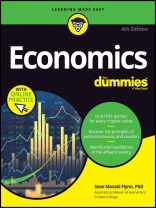Learn the basics of economics and keep up to date on our ever-changing economy
Whether you’re studying economics in high school or college, or you’re just interested in taking a peek into the complexities of how money moves, Economics For Dummies is the go-to reference that transforms complex economic concepts into easy-to-understand reading. With the simple explanations in this book, you’ll master key topics like supply and demand, consumer behavior, and how governments and central banks attempt to avoid–or at least ameliorate–business downturns and recessions. Plus, you’ll learn what’s going on these days with inflation, interest rates, labor shortages, and the Federal Reserve. Studying for an exam? This Dummies guide has your back, with online practice and chapter quizzes to help you get the score you need. It’s time to recon econ, the Dummies way.
* Get a grasp on the unchanging fundamentals of economics
* Dive into behavioral economics and consumer decision making
* Learn what drives economic growth and inequality
* Solidify your knowledge with practice questions and quizzes
Economics For Dummies is an approachable reference book for students, as well as an informative guide for anyone interested in learning more about today’s economy.
Tabla de materias
Introduction 1
Part1: Economics: The Science of How People Deal with Scarcity 5
Chapter 1: What Economics Is and Why You Should Care 7
Chapter 2: Cookies or Ice Cream? Exploring Consumer Choices 23
Chapter 3: Producing Stuff to Maximize Happiness 37
Part 2: Microeconomics: The Science of Consumer and Firm Behavior 59
Chapter 4: Supply and Demand Made Easy 61
Chapter 5: Introducing Homo Economicus, the Utility-Maximizing Consumer 87
Chapter 6: The Core of Capitalism: The Profit-Maximizing Firm 105
Chapter 7: Why Economists Love Free Markets and Competition 129
Chapter 8: Monopolies: Bad Behavior When Competition Is Lacking 155
Chapter 9: Oligopoly and Monopolistic Competition: Middle Grounds 177
Part 3: Applying the Theories of Microeconomics 195
Chapter 10: Property Rights and Wrongs 197
Chapter 11: Asymmetric Information and Public Goods 209
Chapter 12: Internet Economics: Networks and Platforms 225
Chapter 13: Behavioral Economics: Investigating Irrationality 245
Part 4: Macroeconomics: The Science of Economic Growth and Stability 263
Chapter 14: How Economists Measure the Macroeconomy 265
Chapter 15: Inflation Frustration: Why More Money Isn’t Always Good 285
Chapter 16: Understanding Why Recessions Happen 303
Chapter 17: Fighting Recessions with Monetary and Fiscal Policy 329
Chapter 18: Grasping Origins and Effects of Financial Crises 359
Part 5: The Part of Tens 369
Chapter 19: Ten Seductive Economic Fallacies 371
Chapter 20: Ten Economic Ideas to Hold Dear 379
Chapter 21: Ten (Or So) Super-Famous Economists 383
Chapter 22: Ten (Or So) Recent Nobel Laureates in Economics 391
Glossary 397
Index 405
Sobre el autor
Sean Masaki Flynn, Ph D, is an assistant professor of economics at Scripps College, where he also serves as the chairman of the economics department. Dr.??Flynn has been a guest expert on NPR and has been interviewed for articles on Forbes.com. He’s the coauthor of the world’s best-selling economics textbook.












